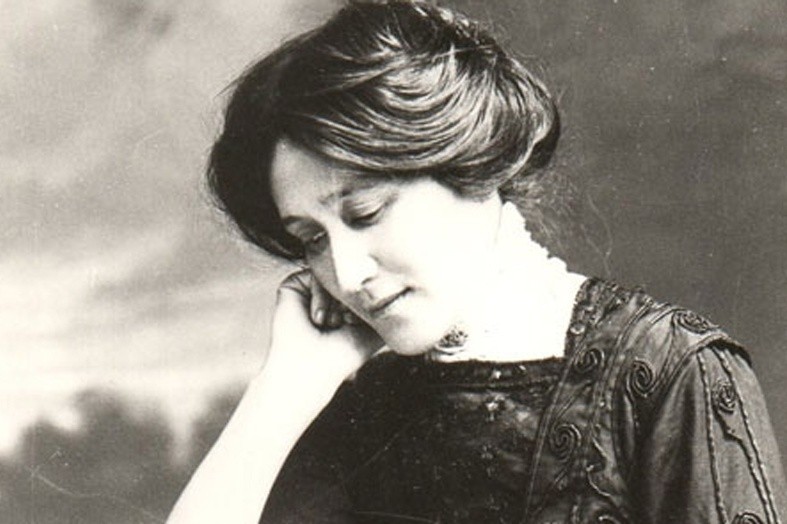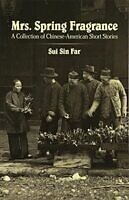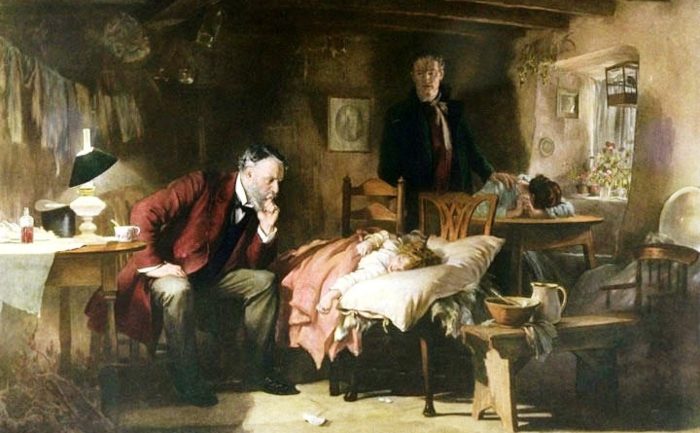The Chinese Lily by Sui Sin Far
 Sui sin Far (1)
Sui sin Far (1)
The Chinese Lily by Sui Sin Far is the story of Mermei, who after an accident is crippled with terrible scars on her face. Her only friend and visitor is her brother who visits her every evening to keep her company. The Chinese Lily appeared in the Mrs Spring Fragrance collection of short stories by Sui Sin Far. The stories were written in the late 19th and early 20th century, compiled and published in 1912.
The Chinese Lily by Sui Sin Far
Mermei lived in an upstairs room of a Chinatown dwelling-house. There were other little Chinese women living on the same floor, but Mermei never went amongst them. She was not as they were. She was a cripple. A fall had twisted her legs so that she moved around with difficulty and scarred her face so terribly that none save Lin John cared to look upon it. Lin John, her brother, was a laundryman, working for another of his countrymen.
Lin John and Mermei had come to San Francisco with their parents when they were small children. Their mother had died the day she entered the foreign city, and the father the week following, both having contracted a fever on the steamer. Mermei and Lin John were then taken in charge by their father’s brother, and although he was a poor man he did his best for them until called away by death.
Long before her Uncle died Mermei had met with the accident that had made her not as other girls; but that had only strengthened her brother’s affection, and old Lin Wan died happy in the knowledge that Lin John would ever put Mermei before himself.
So Mermei lived in her little upstairs room, cared for by Lin John, and scarcely an evening passed that he did not call to see her. One evening, however, Lin John failed to appear, and Mermei began to feel very sad and lonely. Mermei could embroider all day in contented silence if she knew that in the evening someone would come to whom she could communicate all the thoughts that filled a small black head that knew nothing of life save what it saw from an upstairs window. Mermei’s window looked down upon the street, and she would sit for hours, pressed close against it, watching those who passed below and all that took place.
That day she had seen many things which she had put into her mental portfolio for Lin John’s edification when evening should come. Two yellow-robed priests had passed below on their way to the joss house in the next street; a little bird with a white breast had fluttered against the window pane; a man carrying an image of a Gambling Cash Tiger had entered the house across the street; and six young girls of about her own age, dressed gaily as if to attend a wedding, had also passed over the same threshold.
But when nine o’clock came and no Lin John, the girl began to cry softly. She did not often shed tears, but for some reason unknown to Mermei herself, the sight of those joyous girls caused sad reflections. In the midst of her weeping a timid knock was heard. It was not Lin John. He always gave a loud rap, then entered without waiting to be bidden.
Mermei hobbled to the door, pulled it open, and there, in the dim light of the hall without, beheld a young girl—the most beautiful young girl that Mermei had ever seen—and she stood there extending to Mermei a blossom from a Chinese lily plant. Mermei understood the meaning of the offered flower, and accepting it, beckoned for her visitor to follow her into her room.
What a delightful hour that was to Mermei! She forgot that she was scarred and crippled, and she and the young girl chattered out their little hearts to one another. “Lin John is dear, but one can’t talk to a man, even if he 181is a brother, as one can to one the same as oneself,” said Mermei to Sin Far—her new friend, and Sin Far, the meaning of whose name was Pure Flower, or Chinese Lily, answered:
“Yes, indeed. The woman must be the friend of the woman, and the man the friend of the man. Is it not so in the country that Heaven loves?”
“What beneficent spirit moved you to come to my door?” asked Mermei.
“I know not,” replied Sin Far, “save that I was lonely. We have but lately moved here, my sister, my sister’s husband, and myself. My sister is a bride, and there is much to say between her and her husband. Therefore, in the evening, when the day’s duties are done, I am alone. Several times, hearing that you were sick, I ventured to your door; but failed to knock, because always when I drew near, I heard the voice of him whom they call your brother. Tonight, as I returned from an errand for my sister, I heard only the sound of weeping—so I hastened to my room and plucked the lily for you.”
The next evening when Lin John explained how he had been obliged to work the evening before Mermei answered brightly that that was all right. She loved him just as much as 182ever and was just as glad to see him as ever; but if work prevented him from calling he was not to worry. She had found a friend who would cheer her loneliness.
Lin John was surprised, but glad to hear such news, and it came to pass that when he beheld Sin Far, her sweet and gentle face, her pretty drooped eyelids and arched eyebrows, he began to think of apple and peach and plum trees showering their dainty blossoms in the country that Heaven loves.
It was about four o’clock in the afternoon. Lin John, working in his laundry, paid little attention to the street uproar and the clang of the engines rushing by. He had no thought of what it meant to him and would have continued at his work undisturbed had not a boy put his head into the door and shouted:
“Lin John, the house in which your sister lives is on fire!”
The tall building was in flames when Lin John reached it. The uprising tongues licked his face as he sprung up the ladder no other man dared ascend.
“I will not go. It is best for me to die,” and Mermei resisted her friend with all her puny strength.
183“The ladder will not bear the weight of both of us. You are his sister,” calmly replied Sin Far.
“But he loves you best. You and he can be happy together. I am not fit to live.”
“May Lin John decide, Mermei?”
“Yes, Lin John may decide.”
Lin John reached the casement. For one awful second he wavered. Then his eyes sought the eyes of his sister’s friend.
“Come, Mermei,” he called.
“Where is Sin Far?” asked Mermei when she became conscious.
“Sin Far is in the land of happy spirits.”
“And I am still in this sad, dark world.”
“Speak not so, little one. Your brother loves you and will protect you from the darkness.”
“But you loved Sin Far better—and she loved you.”
Lin John bowed his head.
“Alas!” wept Mermei. “That I should live to make others sad!”
“Nay,” said Lin John, “Sin Far is happy. And I—I did my duty with her approval, aye, at her bidding. How then, little sister, can I be sad?”
About the Author
Sui Sin Far was born Edith Maude Eaton; 15 March 1865 – 7 April 1914) in England. Her father was British and her mother was from Shanghai. She was known for her writing about Chinese people in North America and the Chinese American experience. “Sui Sin Far”, the pen name under which most of her work was published, is the Cantonese name of the narcissus flower, popular amongst Chinese people.
Best Sui Sin Far Books

If you enjoyed The Chinese Lily by Sui Sin Far, you might also like to read Our Cat’s Grave by Natsume Soseki











